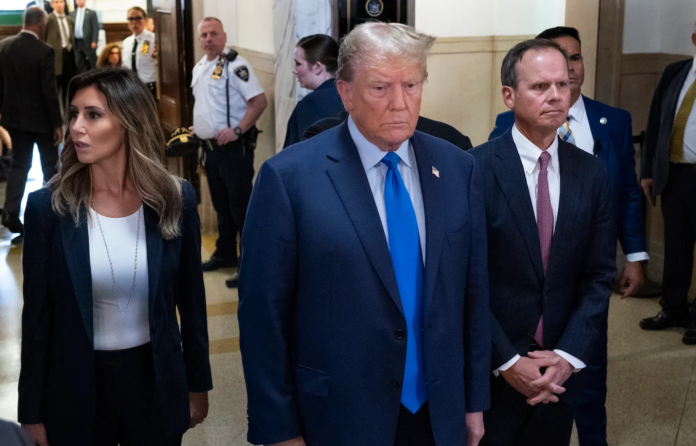Donald Trump has earned a dubious slice of history today, becoming the first former U.S. President to walk into a courtroom as a defendant in a criminal trial. The trial, which starts with jury selection in New York, centers around Trump’s alleged concealment of hush money payments to women he reportedly had extramarital affairs with prior to his 2016 presidential campaign. The looming courtroom battle could last around six weeks, with a verdict possibly coinciding with the high stakes of the Republican National Convention in July, where Trump is expected to clinch the GOP’s 2024 presidential nomination.
In a saga filled with last-minute legal maneuverings, Trump’s legal team has exhausted almost every tactic to delay the trial’s start. From arguing that a fair jury couldn’t possibly be found in New York City to making broad claims about biased pre-trial publicity, Trump’s lawyers have played every card to push back the trial dates. Each attempt has been thwarted by Judge Juan Merchan and appellate courts, setting the stage for what promises to be a deeply scrutinized legal showdown.
At the heart of the trial are accusations that Trump orchestrated payments totaling over $250,000 to adult film actress Stormy Daniels and Playboy model Karen McDougal to suppress allegations of affairs. These payments, prosecutors argue, were not only aimed at influencing the 2016 election but were also unlawfully recorded as legal expenses by the Trump Organization.
If convicted, Trump faces potential imprisonment, though the intricacies of New York law may cap his sentence and reduce the severity of his punishment. However, the broader implications of a felony conviction could severely dampen his presidential campaign, contradicting his claims that legal woes bolster his political standing. Polls suggest that a conviction could indeed alienate voters rather than rally them to his cause.
In the courtroom, Trump is also under a gag order, a common judicial safeguard but one he has vocally opposed, claiming it infringes on his First Amendment rights. This order restricts him from making inflammatory remarks about the trial’s key figures, including the judge and prosecutors, a rule he’s already flirted with breaking in recent public outbursts on social media platforms.
As this historic trial unfolds, it’s not just the immediate legal outcomes that are at stake. Trump’s interactions with the judiciary are setting precedents for how former presidents are treated under the law. They are also a litmus test for the robustness of American legal and political systems facing the unprecedented scenario of a former leader on trial. With the world watching, the outcomes of this trial could resonate far beyond the courtroom, influencing public trust in legal institutions and shaping the narrative of the 2024 Presidential Election.



